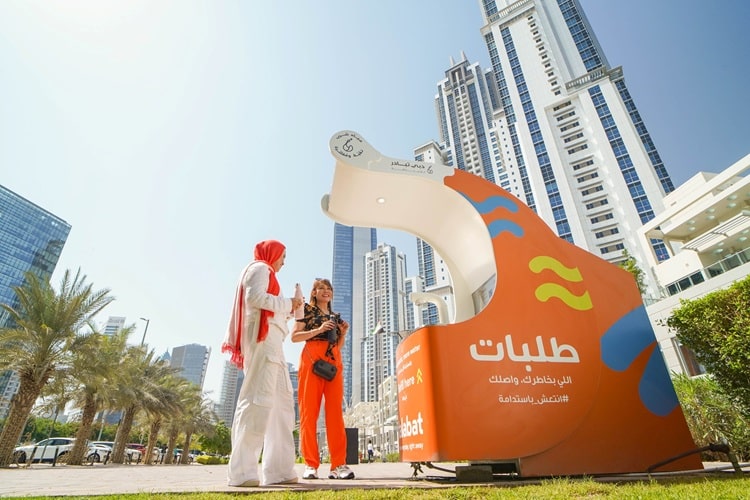Citywide sustainability movement was launched on 15 February 2022 by His Highness Sheikh Hamdan bin Mohammed bin Rashid Al Maktoum
50 public water stations have been installed across the city, dispensing almost 9 million litres of water in just two years
30 new water stations will be installed by the end of 2024
Yousuf Lootah: ‘With Dubai Can, we will continue to encourage residents and tourists to adopt greener practices and lifestyle choices.’
Dubai, United Arab Emirates – -: Dubai Can, the citywide sustainability initiative, has successfully seen a reduction in the usage of an equivalent of almost 18 million 500ml single-use plastic water bottles in just two years since its launch. With the support of its partners and sponsors, Dubai Can has placed 50 public water stations in strategic locations across the city, including parks and popular tourist destinations, which have dispensed almost 9 million litres of water.
Dubai Can was launched on 15 February 2022 by His Highness Sheikh Hamdan bin Mohammed bin Rashid Al Maktoum, Crown Prince of Dubai, Chairman of The Executive Council of Dubai, to reduce the utilisation of single-use plastic water bottles, empower residents and visitors to be active players in building a more sustainable future, and contribute to saving wildlife and the marine environment.
The initiative is aligned with the vision of His Highness Sheikh Mohammed bin Rashid Al Maktoum, Vice President and Prime Minister of the UAE and Ruler of Dubai to transform the emirate into a leading sustainable destination and is part of the wider efforts to cut the use of single-use plastics and encourage a mindset change in how the city’s residents and visitors view sustainability. Dubai Can’s objectives are also supporting the Dubai 2040 Urban Masterplan and Dubai’s commitment to helping the UAE achieve the UN Sustainable Development Goals and UAE NetZero 2050 targets.
With the UAE’s ‘Year of Sustainability’ extending into 2024, the Dubai Can initiative has plans to expand with 30 additional water fountains being installed by the end of the year in locations around the city. This will further motivate residents and visitors to undertake simple lifestyle changes such as using refillable water bottles and installing water filters in their homes, offices and schools.
Yousuf Lootah, Acting CEO of Corporate Strategy and Performance Sector, Dubai Department of Economy and Tourism, said: “The Dubai Can movement has been embraced by residents and visitors alike and we are proud of the considerable success it has achieved since its launch two years ago, in line with the vision of His Highness Sheikh Mohammed bin Rashid Al Maktoum, Vice President and Prime Minister of the UAE and Ruler of Dubai, to make Dubai a leading sustainable destination. We have seen consistent engagement with Dubai Can across the city, and the positive impact the initiative has made over the past two years. By reducing plastic waste, we are protecting our oceans, wildlife, and natural landscapes, and by choosing reusable options like our public water stations, we are promoting a healthier lifestyle and reducing our carbon footprint. We will ensure that Dubai Can will continue to encourage residents and visitors to adopt greener practices and lifestyle choices, in line with the goals of the Dubai Economic Agenda, D33, which aims to consolidate Dubai’s position among the top three global cities for business and leisure over the next decade.
“As we strive to achieve Dubai’s sustainability goals, we look forward to the continued success of Dubai Can, particularly in the UAE’s ‘Year of Sustainability’, which has been extended into 2024 and invites everyone to join in the collective effort to adopt sustainable practices. Dubai Can has driven the behavioral changes that are needed to tackle environmental challenges and the success of this initiative could not have been possible without the support of our valued city stakeholders and partners, as well as the overwhelming response from the public.”
Strong stakeholder support
With the unified aim of achieving sustainable development goals and environmental targets, Dubai Can has partnered with strategic businesses to support the refilling of the city’s 50 plus public water fountains.
Simonida Subotic, Vice President at talabat UAE, said: “We are proud to celebrate Dubai Can’s two-year milestone and the remarkable impact it has on the community. As a tech company, we embrace innovative solutions that create shared value for the public and facilitate the adoption of positive everyday practices. Being in a country such as the UAE, which is spearheading sustainability efforts in the region, enables private companies to play an active role in driving behavioural change. In line with the leadership’s vision and the extension of the Year of Sustainability in 2024, we will be adding two new talabat Dubai Can machines in the city, further contributing to the initiative’s success.”
Walid Yehia, Managing Director – UAE at Dell Technologies, said: “The Dubai Can initiative has made substantial progress in a short span of time, and its mission to reduce the consumption of single-use plastic water bottles is truly commendable. The initiative aligns with Dell’s global efforts to foster sustainable and environmentally friendly business practices. By harnessing the latest technological advancements, we can encourage responsible actions and contribute to a future where plastic waste is minimised. We remain committed to the Dubai Can initiative and look forward to expanding our collective impact in reducing plastic waste and contributing to a more sustainable and resilient Dubai.”
Vijay Bains, Chief Sustainability Officer and Group Head of ESG at Emirates NBD, said: “As an organisation that has consistently championed sustainability and advocated environmental preservation, we at Emirates NBD are delighted to celebrate the outstanding success of the Dubai Can initiative, launched two years ago, and reaffirm our commitment to its continued progress and success. As one of the early supporters of the initiative, we have installed public water stations across three locations, including The Greens and Views, South Ridge in Downtown and Dubai Sports City. We take immense pride in sharing that our endeavours have helped to save the use of more than one million 500ml single-use plastic water bottles across these areas. It is truly gratifying to witness the overwhelming response from residents and visitors embracing this citywide initiative, taking us one step closer to achieving Dubai’s goal of becoming a sustainable city.”
Abdulla Binhabtoor, Chief Portfolio Management Officer of Shamal Holding, said: “In line with the city’s wider ambitions and the Dubai Economic Agenda’s goal to adopt greener practices and lifestyle choices, we are grateful to Dubai Can for having transformed sustainability narratives, building impact beyond the city and becoming an example for successful practices globally. We are proud to have been closely associated as a partner in this journey. Dubai Can’s purpose, message and mission continues to inspire generations to contribute to make a difference through this sustainability-focused programme. At Shamal, we remain committed to nurturing partnerships and relationships that generate meaningful and sustainable returns and we look forward to continuing to support this citywide sustainability movement across our diverse portfolio including Dubai Harbour and Kite Beach.”
Ahlam Bolooki, CEO of Emirates Literature Foundation, said: “At the Emirates Literature Foundation, sustainability is not something we consider just for the Year of Sustainability. From our offices to our events, we have been prioritising eco-conscious practices for years by providing water coolers and encouraging our community to bring reusable bottles. In alignment with the Dubai Can initiative and His Highness Sheikh Mohammed Bin Rashid Al Maktoum’s D33 agenda to reinforce Dubai’s position amongst the top three global cities, we’re committed to reducing waste and conserving resources. Partnerships play a pivotal role in shaping a sustainable future for our planet. Together, we can inspire meaningful change and ensure a greener, healthier world for generations to come.”
Tim Cordon, Chief Operating Officer for the MEA and SEAP of Radisson Hotel Group, said: “Over the past years, we at Radisson Hotel Group have implemented several practices and launched initiatives as part of our commitment to drive a pro-environmental strategy. The irreversible ramifications of plastic on our environment are a major challenge to us today, and the Dubai Can initiative aims to defy this obstacle. We are proud to be part of this ingenious step towards a greener UAE.”
Many private companies in the emirate have been inspired by Dubai Can to install water fountains in their offices, reducing single-use plastics in the workplace. Above all, the movement has encouraged residents and visitors to the UAE to adopt more sustainable behaviours and become conscientious consumers.
Driving a ‘refill culture’
All water stations throughout the city adhere to the highest hygiene standards and comply strictly with municipal, healthcare, and federal regulations. The stations provide clean and safe drinking water, which is tested in accordance with DEWA, GCC, and World Health Organization standards. While driving a ‘refill culture’, the drinking water from the stations are kept cool at a temperature of 10°C offering people a refreshing, clean and safe alternative.
A resident in the UAE typically uses 450 plastic water bottles on an average in a year, which translates into a total of 4 billion plastic bottles being used annually across the country. The Dubai Can initiative will continue to encourage residents and visitors to help reduce waste and prevent millions of plastic bottles from ending up in landfill and in our oceans.
A second Dubai Can project, the Dubai Reef, was also launched in December 2023. One of the world’s largest marine reef developments, Dubai Reef is part of the city’s efforts to increase fish stocks, support sustainable fishing, and contribute to boosting food security. It will also play a vital role in reducing carbon emissions and increasing marine biodiversity.




